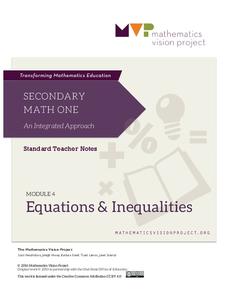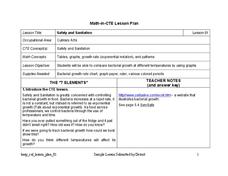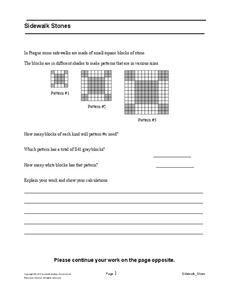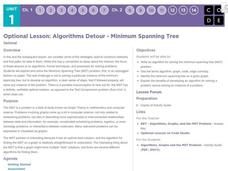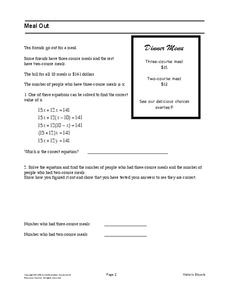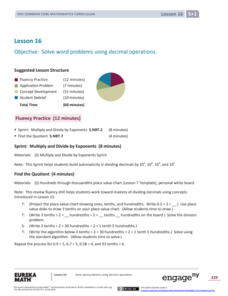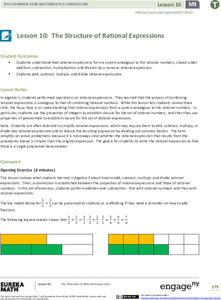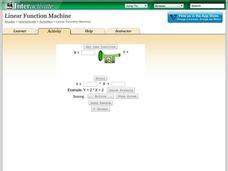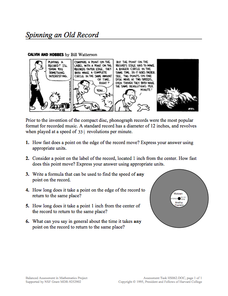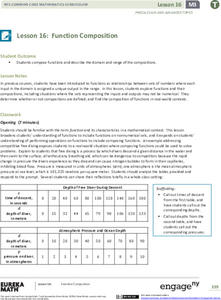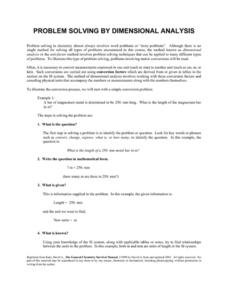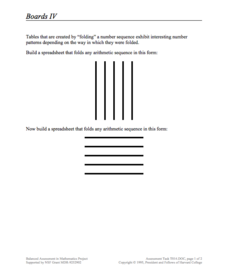Virginia Department of Education
How Much is that Tune?
Tune in for savings! Scholars investigate pricing schemes for two different online music download sites. After comparing the two, they determine the numbers of songs for which each site would be cheaper.
Mathematics Vision Project
Equations and Inequalities
Help learners get their facts in line to build and solve complicated linear equations and inequalities. Pupils build upon their knowledge of solving basic equations and inequalities to solve more complex ones. Individuals work with...
Concord Consortium
Bicycle Chain
Model a bicycle chain with circles and tangent lines. Given the dimensions of the sprocket wheels, young scholars calculate the length of the chain that surrounds them. A second task has learners write a function for the length of a...
Grammar Net
Adjectives of Comparison
Is our car bigger than theirs? Is this car better than than that one? Use comparative and superlative adjectives of provided verbs to complete twenty sentences.
National Research Center for Career and Technical Education
Safety and Sanitation
Your microbiologists explore the graphing of exponential growth functions using bacteria, like e. coli and salmonella, in a well-written, career and technology lesson.
Mathematics Assessment Project
Sidewalk Stones
One block, two blocks, white blocks, gray blocks. In the high school assessment task, learners investigate patterns of sidewalk stones to develop a quadratic expression for each colored block. Young mathematicians then use the expression...
Balanced Assessment
Catenary
Develop a model for a hanging chain. Pupils find a mathematical model for a hanging chain and then they compare their models to the precise function that models the curve. Scholars come up with a strategy to determine how close...
Concord Consortium
Betweenness IV
Challenge your classes to think between the curves. Given two function formed by the combination of two exponential functions, individuals must write three functions in which all values would lie between the given. The question is...
Willow Tree
Approximating a Line of Best Fit
You may be able to see patterns visually, but mathematics quantifies them. Here learners find correlation in scatterplots and write equations to represent that relationship. They fit a line to the data, find two points on the line, and...
Balanced Assessment
Books from Andonov
To examine mathematical functions in a modeling situation pupils combine quadratic and step functions to represent a presented scenario. They both graph and write a function to represent data shown in a table.
Curated OER
Compare and Contrast Night to Life is Beautiful
After reading Elie Wiesel's Night, watching the movie Life is Beautiful, and researching World War II, class members write a comparison essay on the book and film. This includes a prior knowledge activity, discussion in whole and small...
Curated OER
Multiplication: Bugs Can Multiply, So Can I!
Develop multiplication skills with your class. Youngsters will visualize multiplication as repeated addition. Then they will create a multiplication bug book and discover arrays as a strategy for multiplication problem solving....
Code.org
Algorithms Detour - Minimum Spanning Tree
This optional lesson introduces the class to the idea of a minimum spanning tree. The activity focuses on determining an algorithm that will find the most efficient path in a network to transfer data.
Mathematics Assessment Project
Meal Out
Middle schoolers identify an equation in one variable that models a restaurant order. They then solve the equation to determine the number of people who had each type of meal.
EngageNY
Grade 5 Math Module 1, Topic F, Lesson 16
See, decimal operations do come in handy! Pupils solve word problems that require adding, subtracting, multiplying, and dividing decimals. They use tape diagrams to express relationships and to identify the necessary operations to solve...
EngageNY
The Structure of Rational Expressions
Find out when rational expressions are closed. Pupils review adding, subtracting, multiplying, and dividing with rational numbers to make the connections to operations with rational expressions. Using specific examples, learners notice...
Concord Consortium
Swimming Pool II
Combine geometry and algebra concepts to solve a modeling problem. Young scholars consider the effect surface area has on volume. They write a cubic function to model the possible volume given a specific surface area and then...
Shodor Education Foundation
Linear Function Machine
What goes in must come out! Learners play with a function machine to determine the correct function. They enter input values and watch as the machine produces the output.
Concord Consortium
Spinning an Old Record
Take a trip back in time to examine angular velocity. Using the revolutions per minute, learners calculate the speed of a point on a 33 record. They compare the speed of a point on the edge of the record to the speed of a point closer to...
Concord Consortium
Here Comes the Sun
Many phenomena in life are periodic in nature. A task-based lesson asks scholars to explore one of these phenomena. They collect data showing the sunrise time of a specific location over the period of a year. Using the data, they create...
Concord Consortium
Integer Solutions
Experiment with integer relationships. Young scholars consider integers that have a sum of 10. They begin with two integers, then three, four, and more. As they consider each situation, they discover patterns in the possible solutions.
EngageNY
Function Composition
Combine functions for the first time. Pupils investigate composition of functions using a function table and then function machines in the 17th installment in a 23-part Precalculus series. Scholars learn the two notations for composition...
Chymist
Problem Solving by Dimensional Analysis
Is your class in another dimension with regards to dimensional analysis? Give them some extra practice with a straightforward activity. Learners convert units by following concise step-wise examples, including setting up the...
Concord Consortium
Boards IV
Build a connection between algebraic sequences and spreadsheets. Learners examine a specific folding pattern and convert the pattern into a spreadsheet. The goal of the spreadsheet is to produce a sequence of a specific pattern modeled...



